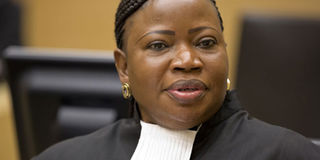Fatou Bensouda, Karim Khan clash over witness withdrawal

ICC Prosecutor Fatou Bensouda. The opening of the trial in the case The Prosecutor v. William Samoei Ruto and Joshua Arap Sang took place on Tuesday, 10 September 2013, at 09:30 (The Hague local time), before Trial Chamber V(a) of the International Criminal Court (ICC). Trial Chamber V(a) is composed of Judges Chile Eboe-Osuji, Presiding, Olga Herrera Carbuccia and Robert Fremr.
What you need to know:
- He charged that the withdrawal of witnesses was just an example of incompetent investigations launched by Ms Bensouda’s predecessor, Mr Luis Moreno-Ocampo.
- The prosecution had also displayed a clip of Mr Ruto being crowned a Kalenjin elder, to which Mr Khan retorted that even President Kibaki and Mr Raila Odinga had publicly gone through similar ceremonies.
- He told the hearing that the court had the responsibility to ensure justice for the victims who suffered terribly from a programme of “ethnic cleansing”.
Prosecutor Fatou Bensouda and William Ruto’s lawyer Karim Khan got into an early tussle over the withdrawal of witnesses as the trial opened Tuesday.
In her opening remarks, Ms Bensouda had referred to the withdrawal of prosecution witnesses as worrying and must be investigated.
She suggested that witnesses were pulling out and recanting testimony after being bribed, threatened and intimidated.
But when he got on his feet, Mr Khan harshly criticised the prosecution for bringing a shoddy case that was “crumbling before it started”.
He charged that the withdrawal of witnesses was just an example of incompetent investigations launched by Ms Bensouda’s predecessor, Mr Luis Moreno-Ocampo.
“We don’t want witnesses to withdraw, we want them to come and tell the truth without inducement or coaching”, he told the court.
He went on to charge that many of those lined up by the prosecution had been coached and coerced by NGOs and their false testimony taken up by the investigation.
He termed the prosecution a conspiracy of lies and woeful inadequacies.
In an indication of how the case might unfold, Mr Khan on Mr Ruto’s side and Ms Bensouda duelled on Mr Ruto’s role and character in relation to ethnic rivalries in the Rift Valley pitting the Kikuyu and the Kalenjins.
The prosecution portrayed Mr Ruto as the anointed Kalenjin leader who up to 18 months before the 2007 elections was assembling an ethnic “network”, an organised criminal group, to seize power by violent means if he failed at the ballot box.
Much of the indoctrination, hate speech and coordination of the attacks, she claimed, was handled by Mr Ruto’s co-accused, Mr Joshua Sang, who allegedly put at the disposal of the “network” his popular Kalenjin language programme on Kass FM.
“This man who hates the Kikuyu, this ethnic cleanser…did the prosecution check that his two sisters are married to Kikuyu?” Mr Khan posed.
He pointed out that Mr Ruto has nephews from those marriages and they carry not Kalenjin, but Kikuyu names. “Was that fact not of interests to the prosecution?” he asked. Even the person who ran the public address system at Mr Ruto’s house where plans were allegedly hatched before a large gathering to eliminate the Kikuyu was himself a Kikuyu.
The prosecution had also displayed a clip of Mr Ruto being crowned a Kalenjin elder, to which Mr Khan retorted that even President Kibaki and Mr Raila Odinga had publicly gone through similar ceremonies.
And the lawyer for victims at the ICC trial, Mr Wilfred Nderitu, argued that many victims of the 2007-98 violence had suffered repeat violations going back to the outbreaks of such clashes in the Rift valley going back to the 1992 and 1997 elections.
He told the hearing that the court had the responsibility to ensure justice for the victims who suffered terribly from a programme of “ethnic cleansing”.
The victims, he said, had as much a stake in the proceedings as the accused and the prosecution that were garnering much attention.
He said that the whole principle of international justice would count for nothing if there was no justice for those most directly affected by genocide. “If there were no victims, there would be no case,” he quoted an unidentified victim.
The lawyer stressed that six years after the post-election violence, the victims continue to live in fear and insecurity, with the government unwilling to address their concerns and their only recourse lying in the ICC.
He urged the court to ensure justice for the victims, protect them from continuing harassment and ensure compensation and reparations.





